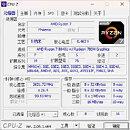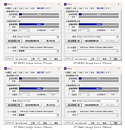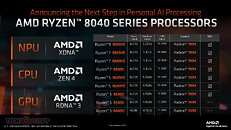T0@st
News Editor
- Joined
- Mar 7, 2023
- Messages
- 2,897 (3.78/day)
- Location
- South East, UK
| System Name | The TPU Typewriter |
|---|---|
| Processor | AMD Ryzen 5 5600 (non-X) |
| Motherboard | GIGABYTE B550M DS3H Micro ATX |
| Cooling | DeepCool AS500 |
| Memory | Kingston Fury Renegade RGB 32 GB (2 x 16 GB) DDR4-3600 CL16 |
| Video Card(s) | PowerColor Radeon RX 7800 XT 16 GB Hellhound OC |
| Storage | Samsung 980 Pro 1 TB M.2-2280 PCIe 4.0 X4 NVME SSD |
| Display(s) | Lenovo Legion Y27q-20 27" QHD IPS monitor |
| Case | GameMax Spark M-ATX (re-badged Jonsbo D30) |
| Audio Device(s) | FiiO K7 Desktop DAC/Amp + Philips Fidelio X3 headphones, or ARTTI T10 Planar IEMs |
| Power Supply | ADATA XPG CORE Reactor 650 W 80+ Gold ATX |
| Mouse | Roccat Kone Pro Air |
| Keyboard | Cooler Master MasterKeys Pro L |
| Software | Windows 10 64-bit Home Edition |
GPD has disclosed to ITHome that a specification refresh of its Win Max 2 handheld/mini-laptop gaming PC is incoming—this model debuted last year with Ryzen 7040 "Phoenix" APUs sitting in the driver's seat. A company representative provided a sneak peek of an upgraded device that sports a Team Red Ryzen 8040 series "Hawk Point" mobile processor, and a larger pool of system memory (32 GB versus the 2023 model's 16 GB). The refreshed GPD Win Max 2's Ryzen 7 8840U APU was compared to the predecessor's Ryzen 7 7840U in CPU-Z benchmarks (standard and AX-512)—the results demonstrate a very slight difference in performance between generations.
The 8040 and 7040 APUs share the same "Phoenix" basic CPU design (8-cores + 16-threads) based on the prevalent "Zen 4" microarchitecture, plus an integration of AMD's Radeon 780M GPU. The former's main upgrade lies in its AI-crunching capabilities—a deployment of Team Red's XDNA AI engine. Ryzen 8040's: "NPU performance has been increased to 16 TOPS, compared to 10 TOPS of the NPU on the 'Phoenix' silicon. AMD is taking a whole-of-silicon approach to AI acceleration, which includes not just the NPU, but also the 'Zen 4' CPU cores that support the AVX-512 VNNI instruction set that's relevant to AI; and the iGPU based on the RDNA 3 graphics architecture, with each of its compute unit featuring two AI accelerators, components that make the SIMD cores crunch matrix math. The whole-of-silicon performance figures for "Phoenix" is 33 TOPS; while 'Hawk Point' boasts of 39 TOPS. In benchmarks by AMD, 'Hawk Point' is shown delivering a 40% improvement in vision models, and Llama 2, over the Ryzen 7040 "Phoenix" series."




ITHome reported on the reasoning behind system memory upgrades for the manufacturer's 2024 devices: "GPD officials said that 16 GB of memory will be the minimum requirement for AI PCs, so subsequent AI PCs with 32 GB of memory should be standard, and AI PCs with 64 GB of memory will also be common."


GPD's entry-point recommendation aligns with recent Microsoft advisements.
View at TechPowerUp Main Site | Source
The 8040 and 7040 APUs share the same "Phoenix" basic CPU design (8-cores + 16-threads) based on the prevalent "Zen 4" microarchitecture, plus an integration of AMD's Radeon 780M GPU. The former's main upgrade lies in its AI-crunching capabilities—a deployment of Team Red's XDNA AI engine. Ryzen 8040's: "NPU performance has been increased to 16 TOPS, compared to 10 TOPS of the NPU on the 'Phoenix' silicon. AMD is taking a whole-of-silicon approach to AI acceleration, which includes not just the NPU, but also the 'Zen 4' CPU cores that support the AVX-512 VNNI instruction set that's relevant to AI; and the iGPU based on the RDNA 3 graphics architecture, with each of its compute unit featuring two AI accelerators, components that make the SIMD cores crunch matrix math. The whole-of-silicon performance figures for "Phoenix" is 33 TOPS; while 'Hawk Point' boasts of 39 TOPS. In benchmarks by AMD, 'Hawk Point' is shown delivering a 40% improvement in vision models, and Llama 2, over the Ryzen 7040 "Phoenix" series."




ITHome reported on the reasoning behind system memory upgrades for the manufacturer's 2024 devices: "GPD officials said that 16 GB of memory will be the minimum requirement for AI PCs, so subsequent AI PCs with 32 GB of memory should be standard, and AI PCs with 64 GB of memory will also be common."


GPD's entry-point recommendation aligns with recent Microsoft advisements.
View at TechPowerUp Main Site | Source



